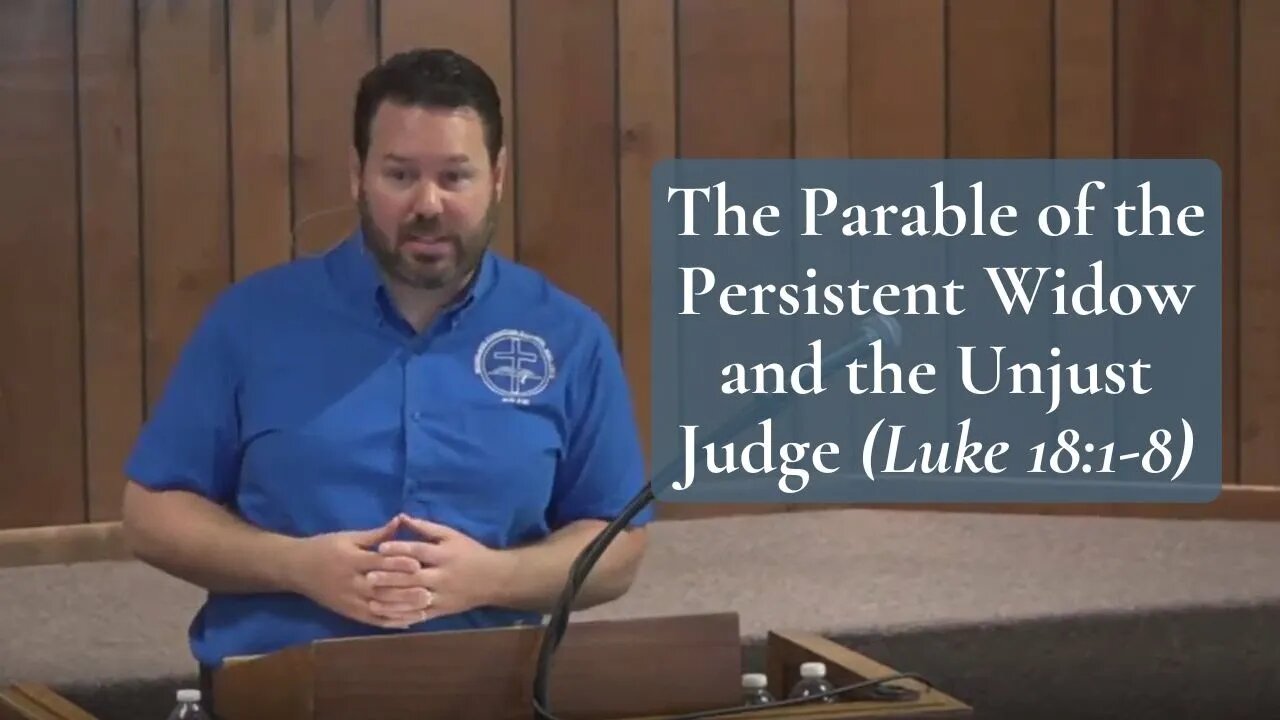Premium Only Content

The Parable of the Persistent Widow and the Unjust Judge (Luke 18:1-8)
The Parable of the Persistent Widow and the Unjust Judge in Luke 18:1-8 is commonly misunderstood. The wrong interpretation is, “Be persistent in prayer until God gives you what you want.” The correct interpretation is if an unjust judge can be persuaded to give justice to a woman he has no regard for, then how much more will God, who is just, give justice to his elect whom he loves.
Here's the accompanying blog post: https://www.scottlapierre.org/the-parable-of-the-persistent-widow/
View all of Pastor Scott LaPierre's books on Amazon: https://www.amazon.com/Scott-LaPierre/e/B01JT920EQ
Receive a free copy of Pastor Scott's book, "Seven Biblical Insights for Healthy, Joyful, Christ-Centered Marriages": https://www.scottlapierre.org/subscribe/
For Scott LaPierre's conference and speaking information, including testimonies, endorsements, and contact info, please visit: https://www.scottlapierre.org/christian-speaker/
#expositionalbibleteaching #bibleteachingsermons #christiansermonsonfaith #biblepreachingsermons #christianpreachingsermons #biblepreaching #christiansermons #expositionalbiblestudy #sermon #bible #christian #jesus #scottlapierre #expositorypreachingsermons
00:00 The Parable of the Persistent Widow and the Unjust Judge (Luke 18:1-8)
06:52 Lesson One: “Ought always to pray” involves a disposition toward God.
11:23 Lesson Two: We can “lose heart” when praying because it is hard work.
27:23 Lesson Three: The widow represents us…to an extent.
33:28 Lesson Four: The parable is primarily about God giving His people justice.
40:27 Lesson Five: Do we have faith like the widow?
The chapter breaks in Scripture are helpful, but they were added by man. One of the dangers with them is they can cause us to think, “This is a new chapter, so it must not be related to the previous chapter.” But it’s the opposite with The Parable of the Persistent Widow and the Unjust Judge. We need to keep the previous chapter in mind to interpret the parable correctly. Everything Jesus taught in Luke 18:1-8 flows from his teaching at the end of Luke 17 on his Second Coming.
The second half of Luke 18:8 says, “when the Son of Man comes.” This is the context. The parable is related to Jesus’s Second Coming. Robert Stein wrote, “The parable serves as a concluding illustration to Luke 17:22-37 [about Jesus’s Second Coming].”1 John MacArthur’s sermon on The Parable of the Persistent Widow and the Unjust Judge is titled, “Persistent Prayer for the Lord’s Return.”
Always Praying Without Losing Heart
Jesus knew that as his disciples waited for his return, they could become discouraged, lose heart, and begin to doubt, so…
Luke 18:1 And he told them a parable to the effect that they ought always to pray and not lose heart.
It’s a theme in Scripture that we ought always to pray:
—Romans 12:12 says, “be constant in prayer”
—Ephesians 6:18 says, “praying at all times”
—Colossians 4:2 says, “continue steadfastly in prayer”
—1 Thessalonians 5:17 says, “pray without ceasing”
When I was Catholic, there was only one way to pray: kneeling with your eyes closed, head bowed, and hands folded. I remember one time when someone wanted to pray with me and I thought we couldn’t pray, because we couldn’t kneel.
When I became a Christian I learned that we didn’t have to pray this way, but I read verses like this one that we ought always to pray, and I was confused. I thought, “How could I pray all the time? I won’t have time for anything else, such as eating, working, or even sleeping, because I can’t pray while I sleep.” To be honest, if you’re like me, and you have trouble sleeping, you pray because you know it will help you fall back to sleep.
“Ought Always to Pray” Involves a Disposition Toward God
We are not expected to – literally – pray all the time. There’s a place for concentrated prayer times, but praying all the time refers to a receptive disposition toward God.
Let me give you an example that I believe illustrates this. When we lived in California, one of my good friends, Pat Mundy, was a cop. One time I was with him, and he noticed someone he said, “didn’t look right.” I asked him why he noticed this person, and he said, “As a cop you’re always looking around at people and situations, seeing if things seem off. Even though I am off duty, I can never really be off duty.”
This is the same for Christians. Even when we are, “Off duty,” which is to say not praying, we are never really “off duty,” in the sense that we haven’t flipped off a switch and started ignoring God. We are not out of communion with him.
Instead, have a receptive disposition toward God. We are still sensitive to him and what he wants from us. We are always ready to seek him in whatever situation we face.
in 1 Samuel 3:4-9 God repeatedly called out to Samuel, but Samuel thought it was Eli. Samuel kept going to Eli, but Eli told Samuel it was not him...
Read the rest of the blog post: https://www.scottlapierre.org/the-parable-of-the-persistent-widow/
-
 1:39:07
1:39:07
vivafrei
5 hours agoWhy Was He Here? Biden Cover-Up of Assault by Afghan Refugees? When Satire Meets Reality & MORE!
19.7K23 -
 LIVE
LIVE
LFA TV
22 hours agoLIVE & BREAKING NEWS! | FRIDAY 11/28/25
1,417 watching -
 LIVE
LIVE
Edge of Wonder
2 hours agoSpiritual Awakenings to Prophetic Dreams & Transformation: Sherri Divband Interview
191 watching -
 LIVE
LIVE
The Mike Schwartz Show
4 hours agoTHE MIKE SCHWARTZ SHOW Evening Edition 11-28-2025
130 watching -
 1:05:35
1:05:35
Russell Brand
6 hours agoMAHA Summit: Comedy, Controversy & Clarity - SF656
74.2K27 -
 49:45
49:45
Liberty Hangout
2 days agoThe Left HATES America and Can't Change My Mind!
87.2K98 -
 23:42
23:42
The Kevin Trudeau Show Limitless
2 days agoThe Brotherhood’s Ancient Mirror Code Revealed
40.5K16 -
 10:18
10:18
Colion Noir
7 hours agoViral TikTok Proves Gun Owners Wrong?
54.3K42 -
![MAHA News [11.28] Team MAHA Dropping Bombs, Pesticide Fight, Campbell's Soup Outed, Save Ranchers](https://1a-1791.com/video/fwe2/11/s8/1/O/6/L/D/O6LDz.0kob-small-MAHA-News-11.28.jpg) 1:19:18
1:19:18
Badlands Media
18 hours agoMAHA News [11.28] Team MAHA Dropping Bombs, Pesticide Fight, Campbell's Soup Outed, Save Ranchers
36K8 -
 1:01:18
1:01:18
DeVory Darkins
7 hours agoBREAKING: Trump issues fatal update to National Guard shooting
142K104